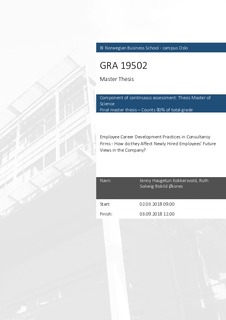Employee Career Development Practices in Consultancy Firms - How do they Affect Newly Hired Employees’ Future Views in the Company?
Master thesis
Permanent lenke
http://hdl.handle.net/11250/2580095Utgivelsesdato
2018Metadata
Vis full innførselSamlinger
- Master of Science [1621]
Sammendrag
The purpose of the study is to examine and gain insights into how consultancy firms can
retain valuable human resources by implementing favourable career development practices
for their newly hired employees. This study aims to answer the following research question:
How do the career practices within consultancy firms affect the newly hired employees’
future views in the company? This question is of importance to consultancy firms today as
their newly hired employees care more about their personal desires and career development,
than monetary rewards. The new organisational career includes a more horizontal career
path, and the companies need to acknowledge that when designing their career development
practices to retain employees. To answer the research question we did a case study of newly
hired consultants working in various consultancy firms located in Norway. The empirical
data were obtained by conducting semi-structured, in-depth interviews. The results show
several ways of how consultancy firm’s career practices affect newly hired employees’ future
views in the company. Lateral career paths, well-defined career practices, perceived personal
HR-investment and support accompanied by autonomy, entrepreneurial creativity, and worklife
balance were highlighted by the respondents. All respondents identified with a
boundaryless, self-directed protean career. We found that the perceived quality of career
practices and models depended on the size of the enterprise. Future research should explore
the factors affecting newcomers’ commitment in consultancy firms, but expand the
population beyond a small qualitative sample to generalize the findings. The thesis highlights
some practical implications concerning the importance of horizontal advancement, mapping
out employee's career orientations, and providing sufficient time, resources, and support. This
study has expanded the scope of existing research related to career development to apply to
the millennials generation and their new viewpoints on modern career development. Given
the qualitative research design of the study, it supplements previous quantitative research
with individual’s perceptions, experiences and attitudes. The research makes a contribution to
consultancy firms as to how design their career development practices to meet the current
developmental needs and interests of employees entering their firm.
Beskrivelse
Masteroppgave(MSc) in Master of Science in Business, Leadership and Change - Handelshøyskolen BI, 2018
